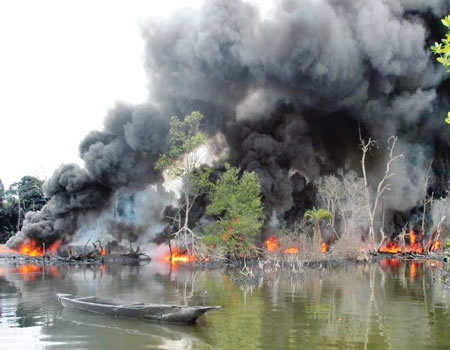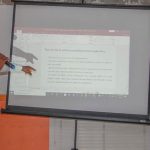Home to about 30 million people, Nigeria’s Niger Delta region is a large area cutting across nine coastal states of Abia, Akwa Ibom, Bayelsa, Cross River, Delta, Edo, Imo, Ondo, and Rivers. The region is rich in resources, including crude oil (Nigeria’s economic mainstay) and biodiversity that play ecological and economic roles to people in the region.
Crude oil from the region accounts for 86% of Nigeria’s export earnings and 90% foreign exchange. But since oil was discovered in the Niger Delta in 1956, pollution from oil spills, pipeline explosions, gas flaring, oil theft and illegal refining has continued to put lives at risk, as residents continue to suffer the health effects of environmental degradation.
Oil spill disaster is a major concern to people in the Niger Delta. Last November, for example, the Santa Barbara River and farmlands in Nembe, Bayelsa State, were polluted due to an oil spill incident at the Oil Mining Lease or OML 29 Wellhead 1 platform operated by Aiteo Eastern Exploration and Production Company or AEEPCO. Those whose livelihoods depend on fishing and farming were directly affected, especially as over a hundred thousand barrels of oil spilt into the environment for 38 days.
Besides oil spillage, black soot – the impure carbon particles that result from the incomplete burning of hydrocarbons – is another environmental problem residents of the Niger Delta face. Activities such as gas flaring, pipeline explosions, and illegal oil refining often send palls of black clouds into the atmosphere in gaseous form. When the ecosystem has absorbed more than it can carry, the excess of those pollutants begins to descend as poisonous soot particles penetrating the lungs through inhalation and coating surfaces. The particles can cause cancers, heart diseases, acute respiratory infections, congenital abnormalities, miscarriage among women and other short and long-term health troubles.
The United States Environmental Protection Agency says black soot remains one of the deadliest forms of air pollution worldwide. It is one of the biggest environmental threats to human health, alongside climate change.
Besides, people and many communities in the Niger Delta lack access to essential things like clean drinking water due to the pollution of water bodies. For example, according to a 2011 UNEP report, the entire land of Goi community in Rivers State has been contaminated since 2005 when crude oil from a spill from Bodo, a neighbouring community, sunk into the ground and water bodies of Goi. Based on expert recommendations, all members of Goi had to desert their community and relocate to a less polluted neighbouring community. Now, Goi is a ghost community; no human lives there.
Government regulations towards curbing polluting activities in the region have been weak over many decades; hence, pollution has continued.
Civil society groups empower communities to fight
As cases of environmental degradation continue to increase, civil society organizations or CSOs have advocated for practical steps to ensure checks around oil activities and the safety of the environment and people living there. Recently, advocacy groups began training community members in environmental monitoring so they (community members) can monitor and report ecological pollution incidents to the authorities CSOs.
For example, on April 13 this year, about 40 people drawn from oil-bearing communities in Iwherekan in Delta and Ekpetiama in Bayelsa states received training from Health of Mother Earth Foundation or HOMEF, a local environmental think tank based in the Niger Delta, on ecological monitoring in Yenagoa, Bayelsa State capital.
HOMEF’s executive director, Nnimmo Bassey, said people who reside near oil and gas fields require capacity building in environmental management. He said the training equipped them with knowledge and tools to remain vigilant and report any activity that could threaten the environment.
Alagoa Morris, Project Officer, Environmental Rights Action, at Niger Delta Resource Centre in Yenagoa, said trained community monitors would report pollution incidents to the authorities and environmental rights groups that would further pressure polluters to pay compensation to affected communities and take remediation steps.
“The essence of the training is to empower participants to effectively observe changes in their environment and make factual reports to the relevant agencies of government and other critical stakeholders like the media and NGOs with a view to getting desired results in the common interest of the community,” he told Prime Progress.
Morris stressed that because environmental issues are widespread and interconnected with communities and people, monitoring the environment demands evidence-based data collection, recording and reporting.
“The training was to afford participants the capacity to know what to do when certain things happen in their environment” and “not be passive but say or do something when they see something,” he said.
Nigeria's Niger Delta region, home to about 30 million people, spans nine coastal states and is rich in crude oil, which accounts for 86% of Nigeria's export earnings and 90% of its foreign exchange. Since the discovery of oil in 1956, the region has faced severe environmental degradation due to oil spills, pipeline explosions, gas flaring, oil theft, and illegal refining, leading to significant health and livelihood impacts.
Oil spills, such as the one in Bayelsa State in November last year, wreak havoc on fishing and farming communities. Related environmental issues like the emission of black soot from hydrocarbon burning result in severe health problems, such as cancer and respiratory infections. Weak government regulations have failed to curb these polluting activities effectively.
Civil society organizations are stepping in to help, training local communities in environmental monitoring to report pollution incidents. For instance, the Health of Mother Earth Foundation (HOMEF) trained 40 people from Delta and Bayelsa states on ecological monitoring. These trained monitors, such as those supported by the Environmental Rights Action, are now better equipped to report pollution and push for compensation and remediation.






